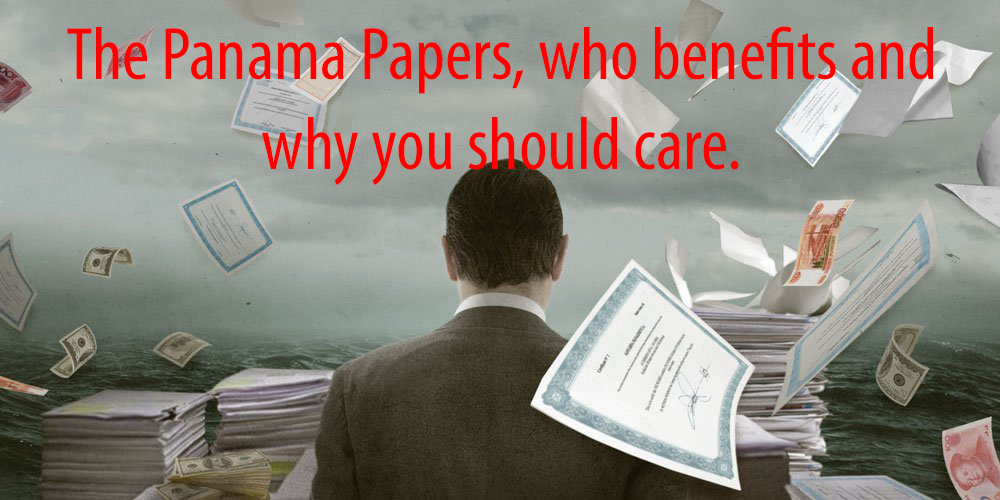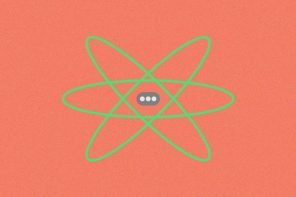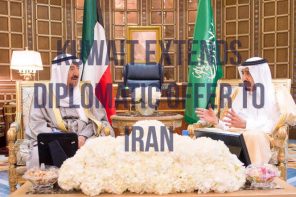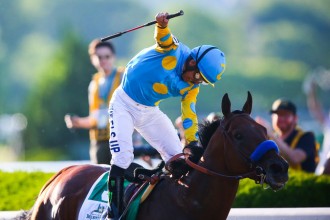When Edward Snowden calls it:
“the biggest leak in the history of data journalism”
We perk up!
The Panama Papers, an investigation into the billions of dollars stashed in off-shore accounts of high and low profile people around the world, offers a rare glimpse into the black market of international banking. Exposing world leaders who hadn’t disclosed their off-shore accounts, and tracing money back to blacklisted countries like Iran and North Korea, are just some of the fascinating stories out of this year long investigation by the International Consortium of Investigative Journalists. We’re also interested in something no one seems to be talking about, the United States role in all of this…
My two big question:
- Who benefits most from the this leak? My guess: The US. This is a great background piece from Bloomberg, on the US becoming one of the best places to stash your cash. “By resisting new global disclosure standards, the U.S. is creating a hot new market, becoming the go-to place to stash foreign wealth. Everyone from London lawyers to Swiss trust companies is getting in on the act, helping the world’s rich move accounts from places like the Bahamas and the British Virgin Islands to Nevada, Wyoming, and South Dakota.”
- Who benefited most of these transactions? My guess: Rich people and the United States and England. We may say we’re for transparency, but most of the Russian and Chinese money was filtered through this Panama-based law firm into real estate and other investments in more stable countries… like here at home in America. I hear real estate in New York now accepts cash transaction… no need for much paper work. From the Real Deal, who offers a list of New York real estate connections:
“Witkoff, best known in New York for developing high-end condo projects such as 150 Charles Street and 10 Madison Square West and owning commercial assets such as the Helmsley Park Lane Hotel and the Woolworth Building, appears to have links to an offshore entity in connection with a project it worked on in London, the redevelopment of a landmark office building known as Devonshire House.”
From the ICIJ on their findings:
Show how major banks have driven the creation of hard-to-trace companies in offshore havens. More than 500 banks their subsidiaries and their branches – including HSBC, UBS and Société Générale – created more than 15,000 offshore companies for their customers through Mossack Fonseca.
The Wall Street Journal is reporting on connections inside the United States:
No U.S. banks are among the 10 biggest banks banks named as the biggest creators of offshore companies for clients.
Still, the U.S. is the fourth largest country where the intermediaries for offshore accounts operate. That makes it likely that specific U.S. connections to Mossack Fonseca will emerge. The Justice Department has said it is reviewing the published documents for evidence of corruption that could be prosecuted in the U.S.
The ICIJ has said it will release the full list of companies and people linked to them in early May. Until then, the identities of these intermediaries operating in the U.S. were and their clients may remain a mystery.
Here’s more on the findings and why they matter to you,
From Vice:
Offshore companies aren’t illegal—not inherently, anyway. But using them to hide assets from tax authorities, thwart investigations, and protect criminals is.
11.5 million leaked documents that detail the inner workings of Mossack Fonseca, a law firm accused of helping drug lords, sports stars, Ponzi schemers, kings, presidents, prime ministers, FIFA officials, mafia members, high-profile thieves, high-ranking politicians, and at least one convicted sex offender launder money, evade taxes, and escape criminal prosecution—are a big deal.
Mossack Fonseca has ties to the $37 million Brink’s-MAT robbery of 1983, which British media called “the crime of the century.” Thirty-three of its clients have been blacklisted by the US government for allegedly doing business with Mexican drug lords, terrorist organizations, and “rogue nations” like North Korea and Iran. Its files have unearthed a secret, shady $2 billion trail of money that leads to Vladimir Putin. One of its clients played a crucial role in the Watergate scandal. Another was convicted for the torture and murder of a US drug enforcement agent.
An individual, often through a middle-man he or she is close to, pays Mossack Fonseca to create a “shell company”—a business on paper, but in reality, a storehouse for a shit-ton of money, whether in cold hard cash or tied up in shares. Mossack Fonseca sets up the shell company offshore in a place like Panama (where the firm is based), the British Virgin Islands, or any other “tax haven”—a place where the true owners of a company can be anonymous and their home country (which, typically, doesn’t know about the company in the first place) can’t tax it.
Say a politician makes $100,000 per year as his or her salary, and for some reason—bribes, business deals, all manner of shady shit—also makes upward of $1 million in some other way. If he or she puts that money in an offshore shell company, he or she can access it without being taxed for it. Even if the shell company is discovered, it can’t be tied directly to the politician because the company is technically owned by someone else—a stand-in owner who’s appointed by Mossack Fonseca to run the company on paper, but, in reality, doesn’t own anything. To move the money, the company pretends to make business deals: The Panama Papers reveal thousands of fake share trades, million-dollar payments for “consultancy,” and huge payouts in “compensation” for canceled transactions.
“This is not business,” money-laundering expert Andrew Mitchell QC told BBC Panorama. “This is creating the appearance of business in order to continually move and hide assets.”
The way that works is tricky. It’s best explained, I think, by a mind-blowing example that the ICIJ highlighted in its reporting:
On February 10, 2011, an anonymous company in the British Virgin Islands named Sandalwood Continental Ltd. loaned $200 million to an equally shady firm based in Cyprus called Horwich Trading Ltd.
The following day, Sandalwood assigned the rights to collect payments on the loan—including interest—to Ove Financial Corp., a mysterious company in the British Virgin Islands.
For those rights, Ove paid $1.
But the money trail didn’t end there.
The same day, Ove reassigned its rights to collect on the loan to a Panama company called International Media Overseas.
It too paid $1.
In the space of 24 hours, the loan had, on paper, traversed three countries, two banks, and four companies, making the money all but untraceable in the process. St. Petersburg-based Bank Rossiya, an institution with a majority owner and chairman who has been called one of Putin’s “cashiers,” established Sandalwood Continental and directed the money flow.
International Media Overseas, where rights to the interest payments from the $200 million appear to have landed, was controlled, on paper, by one of Putin’s oldest friends: Sergei Roldugin.
The point is this: Here, somebody with extremely close ties to Putin traded $200 million for $1. That’s just one of several transactions ICIJ uncovered in Mossack Fonseca’s files—totaling at least $2 billion—that involves companies or individuals “uncomfortably close” to Putin. As ICIJ points out, the money might be changing hands in secret because it’s being used as “payoffs” for aid from the Russian government or big-ticket contracts. To boil what’s at hand down to a word: corruption.
FIFA, it turns out, is more fucked up than we thought—and Mossack Fonseca is involved. Four of the soccer organization’s 16 officials indicted in the US for corruption used Mossack Fonseca to create offshore companies. A member of FIFA’s Independent Ethics Committee, Pedro Damiani, did work for seven MF offshore companies tied to former FIFA Vice President Eugenio Figueredo—the guy who was charged for wire fraud, money laundering, and racketeering in May of last year. Additionally, it looks like there’s no way Damiani didn’t know that Hugo and Mariano Jinkis—a father-son duo who allegedly bribed FIFA officials with tens of millions for broadcasting rights to Latin American matches—were doing something dirty. Damiani is now the subject of an internal investigation by the very ethics committee he helps to run.
Iceland’s prime minister, who came to power after the collapse of several major banks in his country, effectively owned an offshore company (yep, you guessed it, set up by our friends at Mossack Fonseca) that had major holdings in those same banks. I say “effectively” because, though he once owned half of the company’s shares, he’s since sold the rest to his wife. For $1. While it’s unclear if the PM, Sigmundur Gunnlaugsson, did anything illegal, he and his government negotiated settlements with the same banks he held shares in. Since the Panama Papers story broke, he’s been called to step down.
Every major scandal that the Panama Papers have brought to light is equally (if not more) tricky to understand as this whole Putin business. If you’re interested in the evidence behind each shit-show, I’d highly recommend exploring the ICIJ’s website.






